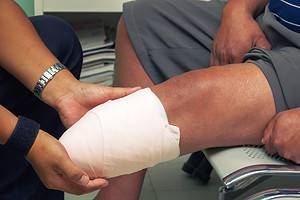Houston Sagemont Amputation Lawyer
 An amputation injury is the loss or removal of a body part due to an accident or injury, causing significant physical, emotional, and financial impacts. If you have experienced an amputation injury, it is crucial to understand your legal rights and options for seeking compensation.
An amputation injury is the loss or removal of a body part due to an accident or injury, causing significant physical, emotional, and financial impacts. If you have experienced an amputation injury, it is crucial to understand your legal rights and options for seeking compensation.
Molina Law Firm and Rick Molina handle amputation cases, in and out of court. Mr. Molina is intimately familiar with amputation cases since he has family members who have suffered from amputation injuries. Molina Law Firm is located at Fuqua and the Gulf Freeway, conveniently located to the Houston Sagemont area and the 77089 zip code.
Whether you need help with amputation injury claims, amputation settlement negotiations, or representation in court, our dedicated team of amputation attorneys is here to support you every step of the way. Don’t wait to seek the help of an experienced Houston Sagemont Amputation Lawyer. Call us at (281) 922-4300 to schedule a free accident consultation.
Understanding the Emotional and Psychological Impact of an Amputation Injury
An amputation injury can have a profound emotional and psychological impact on individuals. The daily grind of an amputation injury can be overwhelming. Coping with the challenges of limb loss and adjusting to a new reality can be overwhelming. It is important to prioritize your mental well-being during the recovery process and build resilience for a positive and fulfilling future.
Coping with Emotional Challenges After an Amputation
After an amputation, you may experience a range of emotions such as grief, anger, frustration, and a sense of loss. It is essential to give yourself time to grieve and process these emotions. Here are some strategies to help you cope:
- Seek support from family, friends, and support groups who can offer understanding and empathy.
- Engage in activities that bring you joy and distract from negative thoughts.
- Practice self-care by prioritizing your physical and emotional well-being.
- Consider therapy or counseling to explore and address your emotions in a safe and supportive environment.
Addressing Psychological Factors in Recovery
Alongside the emotional challenges, amputation can also impact your mental health. Here are some psychological factors to be aware of and strategies to address them:
- Depression and anxiety: It is common to experience feelings of sadness and worry after an amputation. Seeking professional help from a mental health specialist can provide you with strategies to manage these conditions.
- Body image and self-esteem: Adjusting to changes in your physical appearance can be challenging. Surround yourself with supportive individuals and engage in activities that boost your confidence and self-image.
- Post-traumatic stress disorder (PTSD): Some individuals may develop PTSD following an amputation, especially if the injury resulted from a traumatic event. Therapy and counseling can be beneficial in addressing the symptoms of PTSD and helping you heal.
Seek professional help for your mental health. It is an essential part of your overall well-being and recovery. If you need help finding the right type of help, call a Houston Sagemont Amputation lawyer at Molina Law Firm for guidance.
Finding Mental Health Support and Building Resilience
Building resilience and finding mental health support are vital aspects of your amputation recovery journey. Here are some resources and strategies to consider:
- Reach out to amputee support groups and organizations that provide specialized emotional support, guidance, and resources for amputees.
- Consider individual therapy or counseling to address specific mental health challenges you may be facing.
- Engage in activities that promote relaxation, such as meditation, yoga, or mindfulness exercises.
- Stay connected with loved ones, friends, and the amputee community to share experiences, stories, and coping strategies.
- Explore online forums and communities where you can connect with other amputees who understand your journey.
Building resilience and prioritizing your mental health will empower you to navigate the emotional impact of your amputation injury and embrace a fulfilling future.
Types of Amputation Surgery
Amputation surgery involves the partial or complete removal of a limb. Several types of amputation procedures exist, each with its own purpose and considerations.
- Partial Amputation: This surgical procedure aims to preserve as much function and length as possible. The surgeon carefully determines the level of amputation, taking into account the extent and location of the injury or disease, as well as the individual’s overall health status.
- Complete Amputation: In cases where preserving the limb is not possible or poses greater risks, complete amputation may be necessary. This procedure involves the removal of the entire limb to address the underlying condition or injury. Surgeons consider factors such as the individual’s overall health and functionality to determine the most appropriate level of amputation.
- Revision Amputation: Sometimes, despite the initial surgical intervention, further improvement or complication management may be needed. Revision amputation involves a subsequent surgical procedure to refine the amputation site, address ongoing issues, or improve functionality. It is performed after careful evaluation of the individual’s specific circumstances.
Surgeons carefully assess each case to determine the most suitable surgical approach, taking into account the individual’s unique needs and circumstances. The decision regarding the type of amputation surgery is a critical one, as it can significantly impact the individual’s future functionality, quality of life, and rehabilitation process.
Post-Amputation: Care, Treatment, and Rehabilitation
After undergoing amputation surgery, recovery requires careful attention to post-amputation care, treatment, and rehabilitation.
Essential Post-Surgical Wound Care
Healthcare professionals provide expert guidance in cleaning and dressing the surgical wound to reduce the risk of infection and promote healthy healing. By adhering to the recommended wound care regimen, individuals can facilitate the healing process and minimize potential setbacks.
Addressing Phantom Pain and Emotional Toll
Phantom pain, characterized by the sensation of pain in the absent limb, can significantly impact an individual’s emotional well-being post-amputation. Acknowledging and addressing this type of pain is crucial for emotional healing and overall recovery. Healthcare providers, including mental health professionals, can offer strategies to manage phantom pain, alleviate emotional distress, and promote psychological well-being throughout the adaptation process.
Physical Therapy and Prosthetic Adaptation
Physical therapy plays a pivotal role in post-amputation rehabilitation, aiding individuals in regaining strength, mobility, and functionality. Skilled physical therapists develop personalized exercise programs that focus on improving muscle strength, flexibility, and balance. These programs facilitate the adaptation to prosthetic devices by enhancing the individual’s ability to perform daily activities and tasks with their new limb. The integration of physical therapy into the recovery process helps individuals maximize their functional independence and regain their quality of life.
Causes of Amputation Injuries
Amputation injuries can occur due to various causes, resulting in significant physical, emotional, and financial consequences. Understanding the underlying causes is crucial to seeking legal compensation for the losses endured.
Below are some common causes of amputation injuries:
- Traumatic accidents: Car crashes, motorcycle accidents, railroad accidents, and sports-related injuries can lead to severe limb damage, necessitating amputation.
- Workplace incidents: In hazardous industries, workplace accidents involving heavy machinery or the lack of proper safety protocols can result in traumatic amputations.
- Medical malpractice: Negligent medical professionals failing to provide appropriate care can contribute to amputation injuries.
Identifying the responsible party plays a crucial role in pursuing a legal claim to seek compensation for the physical, emotional, and financial losses caused by an amputation injury.
Damages for Accident Amputation Injuries
If you have suffered an accident-related amputation injury, you may be eligible to seek compensation for the damages you have endured. Identifying liability is a crucial step in determining responsibility for the incident and pursuing a legal claim.
Identifying Liability and Your Amputation Claim
In order to establish liability, it is necessary to investigate the circumstances surrounding the accident. This may involve gathering evidence, consulting with experts, and examining any relevant laws or regulations.
An experienced legal team, such as Molina Law Firm, can assist you in navigating the complexities of identifying liability. They have a deep understanding of personal injury cases, including amputation claims, and can guide you through the entire process.
Amputation Injury Compensation: What You Can Expect
When seeking compensation for an amputation injury, various factors will be taken into account. These may include the extent of your physical and emotional pain and suffering, medical expenses, lost wages, and any future impact on your quality of life.
An experienced attorney can help you understand what you can expect in terms of amputation injury compensation. They will evaluate your case, gather relevant evidence, and advocate on your behalf to ensure you receive the maximum amount of compensation you are entitled to.
How a Houston Sagemont Amputation Lawyer at Molina Law Firm Can Assist in Your Amputation Lawsuit
Molina Law Firm has extensive experience in handling personal injury cases, including amputation lawsuits. They have a track record of success in assisting clients in obtaining the compensation they deserve for their amputation injuries.
By working with Molina Law Firm, you can benefit from their expert legal guidance and support throughout the entire process. They will fight for your rights, negotiate with insurance companies, and ensure that you receive the best possible outcome for your amputation lawsuit.
If you have suffered an amputation injury, it is crucial to seek legal assistance as soon as possible. Contact Molina Law Firm at (281) 922-4300 for expert legal help in pursuing your amputation claim and securing the compensation you deserve.
If you have been seriously injured in a Sagemont accident, it is important that you get an experienced personal injury attorney to help you. SEEK JUSTICE. Contact us Today for a Free Accident Consultation.
Free Accident Case Review
If you or a loved one has suffered an injury in an accident, fill out the form below to start your free case review.
Common Types of Auto Accidents in Houston Sagemont
For fastest service call us!
If this is an urgent matter, please consider calling us instead at (281) 922-4300 or click on the phone icon on the left.
Visit our office or we can come to you!
What To Do After a Houston Automobile Accident?
Frequently Asked Questions About Car Accidents
In most car accidents, the at-fault driver and the insurance carrier are liable for all claims resulting from the accident. Sometimes, when the police determine that one vehicle was not completely at fault, then more than one person may be liable and pay for damages. Your personal injury attorney can help you get the compensation you deserve after your car accident.
In Texas, a person that is the majority at fault for an accident may not recover damages. You should seek counsel to conduct the necessary investigation in this situation.
Insurance companies are looking out for their own financial best interests. You will need to hire an attorney to look out for your interests. Once you accept a settlement, then you will be prevented from any future recovery. I normally do not recommend accepting a quick settlement when someone does not have an attorney.


